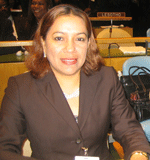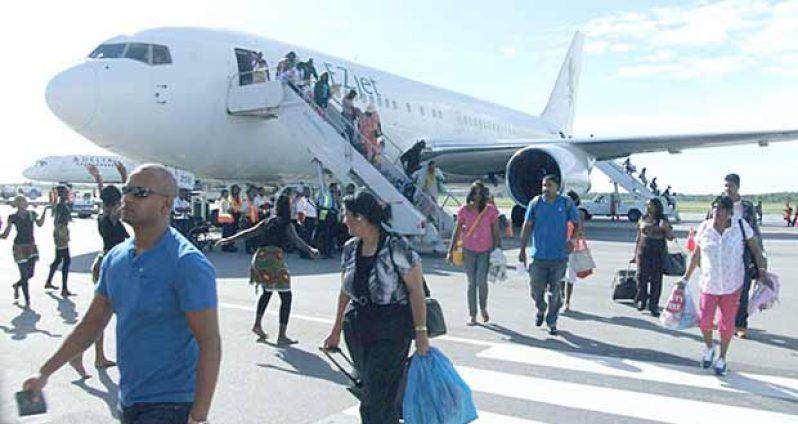FOREIGN MINISTER, Carolyn Rodriques-Birkett was evidently quite pleased in announcing last Thursday that Guyana has become ‘the first’ country of the 15-member Caribbean Community to successfully enact legislation that guarantees free intra-regional movement of CARICOM nationals consistent with the Revised Community Treaty.

Among the more high profile Foreign Ministers of CARICOM, she has been quite active and successful in enlisting support from CARICOM and the Organisation of American States (OAS) for endorsement of the required anti-money laundering and countering funding of terrorism bill designed to save Guyana from being “blacklisted” by the Financial Action Task Force (FATF).
The FATF is the watchdog body that’s linked to the influential bloc of countries in the OECD (Organisation for Economic Cooperation and Development) and has been energetically involved in promoting cooperation with the government by the parliamentary opposition alliance, including visits to Guyana by officials of the Port-of-Spain-based Caribbean Financial Action Task Force (FATF).
Unfortunately for the Foreign Minister, as well as her quite pro-active Attorney General colleague, Anil Nandlall and, of course, the nation state of Guyana as a whole, the parliamentary coalition of A Partnership for National Unity (APNU) and Alliance For Change (AFC) succeeded in their stubborn resistance to score what seems destined to prove a pyrrhic political victory, but more of this development later.
For now, as a founding member of CARICOM, currently in its 40th year, and home to its Secretariat, Guyana can take pride in the fact of its government’s success in being in the forefront of member states of the Community in compliance with required intra-regional free movement legislation that’s an integral component in making a lived reality of the envisaged regional single market and economy (CSME).
As pointed out by the Foreign Minister, the “free movement” legislation, unanimously approved by parliament last Thursday, and which makes Guyana the first to do so, is a basic requirement for ALL participating member states in the seamless CSME.
The right to free intra-regional movement, as citizens of CARICOM-even outside of provisions for long periods of stay, six months and beyond, to live and work in accordance with objectives of the CSME—has gained momentum with the recent historic ruling by the Caribbean Court of Justice (CCJ).
That development involved the case of Jamaican national, Shanique Myrie, against Barbados, and has further etched into public consciousness of Community nationals the legal empowerment of all citizens in good standing with the law.
`
“Mashramani” and economy
It so happens that not just countries like Jamaica, Trinidad and Tobago, Barbados and Guyana that have too often been involved in verbal sparring over denial of free entry by their nationals at ports of entry, but ALL others would now be expected to be more forthcoming in following Guyana’s example in the enactment of required changes in their domestic laws to reflect CARICOM’s intra-regional free movement programme under the CSME project to which they are signatories.
Passage of the ‘free movement’ legislation came against the backdrop of increasingly diversified and creative cultural programmes for nation-wide celebrations of Guyana’s 44th anniversary as a constitutional republic.
Known and marketed as “Mashramani” the virtual month-long cultural activities continue to attract participation of nationals from the Guyanese diaspora in North America as well as CARICOM nationals ahead of this week’s final stages of what still proudly remains the greatest annual cultural show in the Caribbean region—T&T’s Carnival.
For all the dreaded news of spreading criminality it is compelled to address—such as CARICOM partners like Trinidad and Tobago, Jamaica and Barbados in particular in that order—Guyana also was celebrating its 2014 ‘Mashramani’ festival with good news from international financial institutions as well as the Caribbean Development Bank of continuing economic growth and careful fiscal management.
The Executive Board of the International Monetary Fund, for instance, having concluded its 2013 consultation with Guyana has reported that “during the last decade” the country’s “strong macro-economic performance has contributed to a reduction in public debt levels and sustained poverty reduction…..The economy has experienced seven years of uninterrupted growth”, added the IMF, noting that this has averaged about four percent annually.
What a sharp contrast some 21 years later from the long period when Guyanese at home and abroad would recall with sadness, the country’s very humiliating status as one of the poorest and most highly indebted nations of the world!
Analysis by Rickey Singh




.png)









